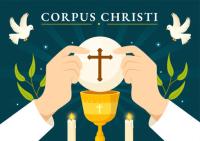
The mysterious King of Salem (possibly Jerusalem), Melchizedek, as king and priest prefigures Christ, who offers himself forever in the bread and wine of the Eucharist. Melchizedek blessed Abraham, the father of faith in the Old Covenant. Jesus, by sacrificing himself, brings about New Covenant. In the Old Testament animals were offered, as it was believed that life was in their blood. Jesus through his death brings us life through the shedding of his blood.
Eucharist means "thanksgiving". As Melchizedek gave a blessing, so in the Eucharist we express our gratitude for the gift of salvation and all that God has done for us. The Lord’s Supper is a meal where we replicate the Last Supper of Passover. It is also Holy Communion, where as a Christian community we become Christ’s body on earth.
The second reading is very valuable, because it is the earliest account of the institution of the Eucharist. The gospel leads us to reflect on the eucharist as food, when we recall the miracle of the loaves and fishes.
The Feast of Corpus Christi, instituted in the fourteenth century, gives the church community a chance to celebrate and contemplate the gift of the Eucharist in a post-Easter setting, as on Holy Thursday we concentrate on the solemnity of Christ’s passion and death.